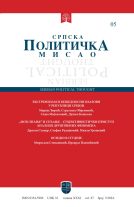- Home page
- Researchers
- Marko B. Tmušić
Marko B. Tmušić
Faculty of Political Sciences, Belgrade

ANALYSIS OF INSTITUTIONAL DETERMINANTS OF THE POLICY OF ATTRACTING FOREIGN DIRECT INVESTMENTS IN SERBIA
The paper deals with the analysis of institutional determinants as incentive measures for attracting foreign direct investments (FDI) in the Republic of Serbia. Special attention is paid to institutional factors such as political and economic stability, level of corruption, the efficiency of the judiciary, then a stable and reliable, and at the same time transparent legal framework, which tries to explain the behavior of foreign investors when choosing a destination. The paper shows that the policy of subsidizing foreign direct investors (whose economic efficiency is being questioned) is created in order to compensate for the institutional shortcomings of Serbia. The consequence of this policy is precisely the institutional inefficiency of the Serbian political and economic system. The main intention of the paper is to point out institutional obstacles to a higher inflow of foreign direct investments, and offer clear guidelines for the development of measures and mechanisms for attracting those foreign investors that are export-oriented, and who plan to stay in the Republic of Serbia in the long run. Experiences so far with regard to foreign investors, clearly show that they pay equal attention when deciding on both economic and political factors, so a greater inflow of foreign investment can be seen in those countries in which the quality of political (and economic) institutions is higher. The Republic of Serbia is still far away (and increasingly moving away) compared to developed countries, in terms of the degree of quality of political institutions and the level of consolidation of democracy. Therefore, the degree of political and economic freedoms is significantly lower than in developed countries. This problem is not only characteristic of Serbia but is also a feature of the entire region. In this regard, a lot of things need to be done to improve government policies that have an institutional character, in order to ensure greater FDI inflows, but this means tackling deep-rooted institutional reforms. The policy of attracting FDI in Serbia was conducted in a non-transparent manner, which opened the possibility for numerous corrupt actions, on the one hand, and discrimination against domestic investors, on the other. It turns out, that subsidies to foreign direct investors are a bad substitute for the development of the institutional order in which companies will invest without any special financial incentives. After sixteen years of non-transparent subsidies to foreign direct investors in Serbia, it is hard to imagine stopping this policy. However, if long-term and sustainable economic growth are to be achieved, strengthening institutions is necessary, while gradual removal of subsidies would be necessary. Numerous analyzes indicate that subsidies only prolong the unsatisfactory engagement of the state when it comes to developing institutions. The quality of institutions, stability of the political system, rule of law, protection of property and implementation of contractual obligations, increasing transparency of the entire process, combating corruption and "unfair" competition, combating political influence, developing of competition - are desirable and correct conditions to encourage greater FDI inflows.
